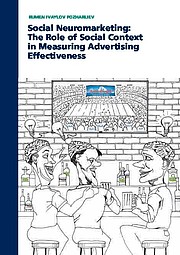Social Neuromarketing: The Role of Social Context in Measuring Advertising Effectiveness Defended on Thursday, 23 February 2017
In this dissertation, I focus on the influence of social context on consumers’ cognitive responses to marketing stimuli. Specifically, I examine the interaction between cortical brain activity, attachment styles and genetic makeup in different social settings. First, I examine the interaction between cortical brain activity and attachment styles in task-free resting-state condition. My goal is to study the effects of social context on cortical brain activity in ad-free environment. I find that social context affects task-free resting-state cortical brain activity and that this effect is modulated by participant’s attachment style. The results suggest increased tonic alertness that is required for more active introspective processes in the social compared to alone condition. Second, I study cortical brain responses to advertising in non-interactive social situation. I find increased attention allocation and motivational significance, both enhanced by the presence of another person, to pictures of luxury branded products. These results suggest that social context enhances customer engagement because of increased nondirective arousal, such as nonspecific attention engagement with branded products. In retail settings, the mere presence of consumers in places where shoppers congregate may amplify feelings of pleasure, joy, and desire. Third, I investigate the interaction between cortical brain activity and participant’s genetic makeup in sales-consumer settings. I find increased socially motivated attention during preference inferences from eye-related cues as opposed to passive viewing of branded products for the GG compared to A-allele carrier individuals. This implies that someone’s genetic makeup can affect his socially motivated behavior. Finally, I argue that marketers who aim to understand and predict advertising effectiveness can benefit from placing participants in social settings in addition to the traditional manner of studying consumer brain responses to marketing-relevant stimuli in social isolation.
Keywords
Neuromarketing, Advertising Effectiveness, Social Context, Luxury Branding, Attention, Emotion, EEG, ERP, Mere Presence, Biomarkers, Personality Traits











